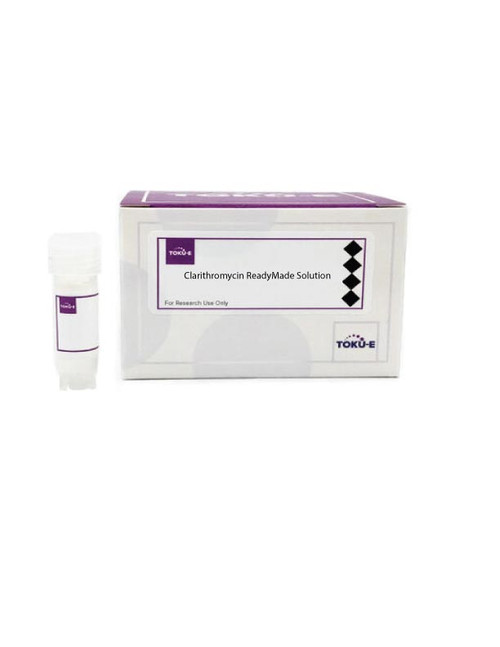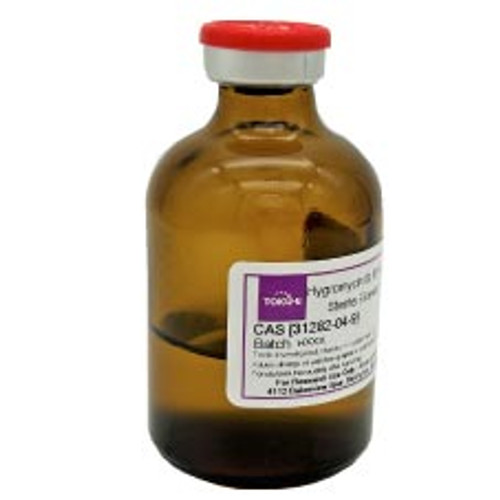Clarithromycin ReadyMadeTM solution is provided as a sterile-filtered solution of Clarithromycin in water at a concentration of 1 mg/ml. It has been filter-sterilized using a 0.22 μm filter.
Clarithromycin is a macrolide antibiotic that is derivative of Erythromycin. The compound is both a substrate and inhibitor of CYP3A4. It affects the autophagic flux by impairing the signaling pathway linking hERG1 and P13K. Clarithromycin has antibacterial, anti-inflammatory and anti-cancer properties. Clarithromycin-related compounds are also available as highly pure EvoPure® products.
We also offer:
- Clarithromycin, USP (C033)
| Mechanism of Action | Macrolide antibiotics inhibit bacterial growth by targeting the 50S ribosomal subunit preventing peptide bond formation and translocation during protein synthesis. Resistance to Clarithromycin is commonly attributed to mutations in 50S rRNA preventing Clarithromycin binding allowing the cell to synthesize error-free proteins.
Anti-cancer mechanisms include reduction of cytokines, inhibition of autophagy, and anti-angiogenesis. The compound can act on signal transduction pathways, transcription factors, drug pharmacokinetics, growth signals, and metastasis. These features can be exploited to make tumor cells more prone to apoptosis and reduce escape mechanisms. The mechanism used depends on the type of cancer. |
| Spectrum | Clarithromycin is a broad-spectrum antibiotic with bacteriostatic action on a wide range of Gram-positive and Gram-negative bacteria including anaerobes. It is also effective for Mycoplasma and Mycobacteria. |
| Microbiology Applications | Clarithromycin is commonly used in clinical in vitro microbiological antimicrobial susceptibility tests (panels, discs, and MIC strips) against Gram-positive and Gram-negative microbial isolates. Medical microbiologists use AST results to recommend antibiotic treatment options.
Representative MIC values include: Haemophilus influenza 2 µg/mL - 32 µg/mL |
| Eukaryotic Cell Culture Applications | An in vitro study on the inhibitory effect of Clarithromycin on transporter-expressing HEK-293 cell lines or membrane vesicles with 13 transporters (OATP1B1, OATP1B3, OAT1, OAT3, OCT1, OCT2, MATE1, MATE2-K, P-gp, BCRP, MRP2, MRP3, and BSEP) found that inhibition profiles were unique to the transporter (Vermeer et al, 2016).
Macrolide antibiotics exert anti-inflammatory effects through inhibition of the production of proinflammatory cytokines. Nuclear factor kb (NF-kb) is an important transcription factor for genes that encode proinflammatory cytokines. In vitro studies with human monocytic leukemia cell line U-937, human T-cell leukemia (Jurkat), a pulmonary epithelial cell line A549, and peripheral blood mononuclear cells were conducted. Clarithromycin was found to suppress the production of proinflammatory cytokines via inhibition of NF-kb (Ichiyama T et al, 2001). Clarithromycin can have immunomodulatory activity on human lymphocyte function. The compound suppressed the synthesis of IL-1a, IL-1b, TNF-a, and GM-CSF in a concentration-dependent manner. This suggests Clarithromycin may modify the acute-phase inflammatory response by disturbing the cytokine cascade (Morikawa K et al, 1996). |
| Cancer Applications | The combined treatment of Clarithromycin with the proteasome inhibitor bortezomib enhances cytotoxicity in the breast cancer cell lines MDA-MB-231 and MDA-MB-468. A wild-type murine embryonic fibroblast (MEF) cell line also exhibited enhanced cytotoxicity (Komatsu et al, 2012). |
| Molecular Formula | C38H69NO13 |
| References | Ichiyama T et al (2001) Clarithromycin inhibits NF-κB activation in human peripheral blood mononuclear cells and pulmonary epithelial cells. Antimicrob. Agents. Chemother. 45 (1): 44-47 PMID 11120942
Komatsu S et al (2012) Clarithromycin enhances bortezomib-induced cytotoxicity via endoplasmic reticulum stress-mediated CHOP (GADD153) induction and autophagy in breast cancer cells. Int. J. Oncol. 40(4):1029-1039 PMID 22200786 Nakamura M et al (2010) Clarithromycin attenuates autophagy in myeloma cells. Int. J. Oncol. 37:815–320 PMID 20811702 Rose, WE et al (2015) Prevention of biofilm formation by methacrylate-based copolymer films loaded with rifampin, Clarithromycin, doxycycline alone or in combination. Pharm. Res. 32(1): 61-73 PMID 24934663 Van Nuffel AMT et al 2015 Repurposing drugs in oncology (ReDO)- Clarithromycin as an anti-cancer agent. Ecancer 9:513 Vermeer LMM, Isringhausen CD, Ogilvie BW and Buckley DB (2016) Evaluation of ketoconazole and its alternative clinical CYP3A4/5 inhibitors as inhibitors of drug transporters: The in vitro effects of ketoconazole, ritonavir, Clarithromycin, and itraconazole on 13 clinically-relevant drug transporters. Drug Metab. Disp. 44 (3) 453-459 PMID 26668209 |








